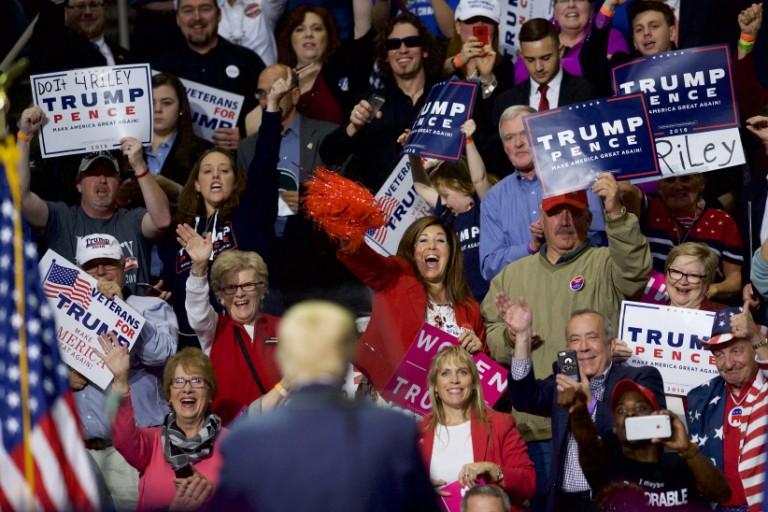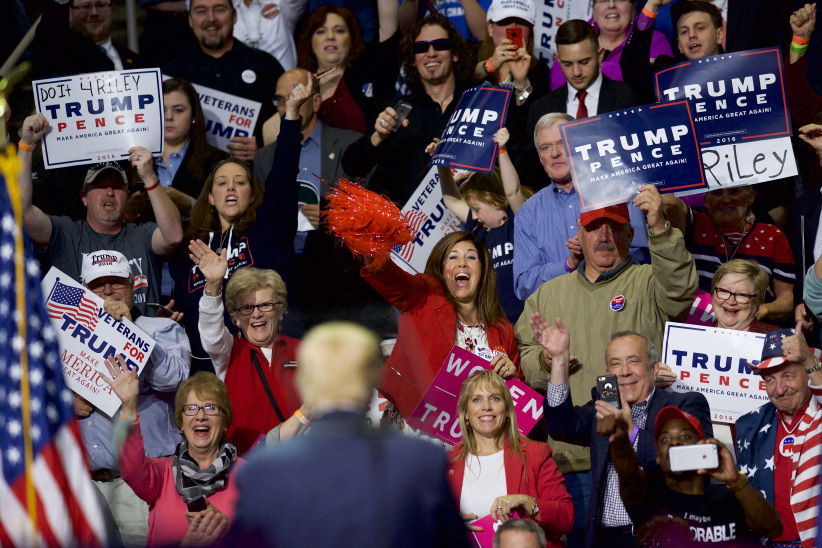Why we should pay attention to Donald Trump’s Facebook page
Donald Trump’s Facebook usage used to be a story that mainstream media monitored, but now it doesn’t care. That’s a mistake.

Supporters cheer Republican Presidential nominee Donald J. Trump during a rally at Giant Center in Hershey, Pennsylvania. (Mark Makela/Getty Images)
Share

Within moments of President Donald Trump’s tweets last week about MSNBC’s ‘Morning Joe’—including that Mika Brzezinski is “dumb as a rock” and her fiancé and co-host Joe Scarborough is “crazy”—it was pretty much all anyone could talk about. As has become routine now, media outlets in the U.S. and elsewhere latched on to the comments, spun out a dizzying mass of related stories, and filled hours of cable news programming discussing the tweets.
Nobody seemed to notice that Trump’s comments about Brzezinski and Scarborough never appeared on his Facebook page. There, rather than posting Trump’s thoughts about cable TV hosts, someone uploaded his schedule for the day. It’s likely that few who were glued to Twitter or TV news realized Trump conducted a phone call with the president of Turkey, Recep Tayyip Erdogan, that morning. But his Facebook followers would have known.
It was a significant piece of news. During the call, Trump and Erdogan discussed the febrile tensions between some Arab states and Turkey’s ally in the region, Qatar (where the U.S. also has a major military base). And any conversation between these two leaders ought to have been a top story. Trump’s courting of Erdogan, who recently consolidated his power over Turkish politics in a referendum this spring, is one of the more troubling relationships the U.S. President has established since entering the White House, emphasized recently by his total silence in response to Erdogan’s security officials beating protesters outside the Turkish embassy in D.C. in May.
MORE: Donald Trump launches verbal attack on MSNBC host Mika Brzezinski
Theories that Trump uses his Twitter account consciously to distract from his real agenda hinge on the idea that he is capable of strategizing to a degree not obvious from his attempts at, say, passing legislation. But whether it is intentional distraction or his simple familiarity with Twitter that compels his comments, the truth is that his tweets are diverting focus from the story that obsessed every media outlet for weeks after Trump’s election: the power of Facebook.
For many Americans, Facebook is not just a website, but effectively the internet itself. According to numbers compiled by venture capital firm Andreesen Horowitz, Facebook’s app eats up 15 to 20 per cent of all time Americans spend on their mobile phones, “making it the largest mobile web browser.” It is the internet, condensed into a personal feed. And there, we have to fall back on the famous dictum of the medium being the message. Whereas on Twitter, posts are assumed to be offhand or pithy, thrown into a gyre, Facebook updates are not similarly considered to be stream-of-consciousness. Posts stick around and live on hours after they first appear, fed into news feeds by Facebook’s non-linear shuffle. Even if the same comment is posted to both, the context changes the delivery.
The effect is this: Twitter Trump is always looking for a fight; Facebook Trump has something to share with his devoted base. And Trump’s team exploits the former to enhance the latter. Take their use of video, for instance.
On June 27, after CNN retracted a story that suggested that the Senate was investigating a Russian bank that had ties to a Trump ally, Trump tweeted “Wow, CNN had to retract big story on ‘Russia,’ with 3 employees forced to resign. What about all the other phony stories they do? FAKE NEWS!” That was followed by a retweet of a mock-up of the CNN logo as FNN, for “fake news network.” The first message was retweeted 34,000 times. But the same tweets, along with some others, were later worked into a video posted to Trump’s Facebook page. The clip, set to rousing music, consists mostly of b-roll of Trump looking presidential with his tweets overlaid, followed by headlines about CNN’s retraction. It runs 45 seconds. It has 3.7 million views.
The video was never posted to Trump’s Twitter account, and perhaps for good reason. According to CrowdTangle, a social analytics company, only 12 per cent of all interactions with Trump’s Twitter account are with videos he posts there. On the other hand, over 40 per cent of Trump’s interactions on Facebook are with videos. His account posts two or three a day, usually. In the last three months, roughly 13 million people have engaged with Trump’s Facebook videos. Another 14 million or so with his photos there. On Twitter, Trump is all about words; on Facebook, the words are still important, but it’s videos and pictures that matter more. This is perhaps more true now than ever before, since Facebook actively promotes video, pushing it to the top of user feeds.
In substance, Trump’s posts on Facebook are not that different from his tweets; they are just slightly curated. It has been reported that the sole app on Trump’s smartphone is Twitter, which strongly suggests that, like other world leaders, his Facebook page is controlled by his staff. They will likely know that no matter the furor that he kicks off on Twitter, it can only spread so far on the social network without mainstream media amplification. On Facebook, however, they don’t need the media’s help.
According to a 2016 Pew study, only 16 per cent of U.S. adults use Twitter, whereas a whopping 67 per cent use Facebook. And of the Facebook users who access the site for news, only a quarter also watch cable TV, and only a third read news via websites or apps. Even if Trump’s tweets headline mainstream news, it’s likely a lot of people won’t notice. For many Americans, Facebook is the only channel. So, you might as well give them something to look at, because the more they watch and share, the more Facebook’s algorithm will show them similar stuff—for instance, other Trump team content. In that way, it becomes self-reinforcing and influential.
Merely watching what Trump says on Twitter is to miss the bigger picture.
Which brings us back to Trump’s daily schedule, by far the most boring thing uploaded to his Facebook page regularly. For reporters who also receive that information on a daily basis, the fact that it appears on Trump’s Facebook page is not very noteworthy. But it serves an obvious purpose in appealing to Trump’s base: it helps support the idea of Trump as a hardworking president.
To what extent that works is difficult to say, but Wednesday’s itinerary update, consisting of a single event–“Travels from Washington, D.C. to Warsaw, Poland”–had by that evening been shared more than 800 times. More than 23,000 people “liked” it; 2,500 people “loved” it. A mere 45 had responded to it with an angry face emoji. Again, Trump didn’t share that schedule on Twitter. Why bother? No one would notice it there.
RELATED: Trump rakes in millions at 2020 campaign fundraiser
Later Wednesday, Trump’s team uploaded a new video. Much like before, it was short – just 43 seconds – and featured his tweets about how the U.S. “made some of the worst Trade Deals in world history” appearing over images of Trump supporters at a recent rally. And, as before, the message beyond the policy is simple: you don’t need to go on Twitter, the Trump team will bring the tweets that matter to you. Within five hours, the video had racked up more than three quarters of a million views.
The reach that Facebook has, and the potential impact of what is posted there, had been a primary focus of media attention before the investigation into the Trump campaign’s ties to Russia came along. That should not have changed. Trump’s phone call last week with Erdogan was big news that most outlets entirely missed, or buried under the drama of a TV star spat. That was a mistake. Trump’s team knows what Facebook can do; so should we.